JI: It's a long time that the world of jazz male singers needed a new representative. Then, as a miracle,
KURT ELLING comes to renew a vocal jazz that was closer and closer to pop music rather than to bop! Did you have the same feeling when you set about the music scene?
K.E.: It would be too much to say that I thought of myself as a "savior"
of anything. However, I did, and do, think that there aren't enough true
explorers in vocal Jazz. That is doubly so among the men, where the numbers are
so much smaller to begin with.
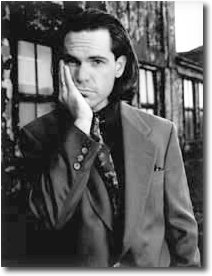 JI:
In your opinion, being a singer is a profession or a mission? JI:
In your opinion, being a singer is a profession or a mission?
K.E.:
More a mission -- to have a profession means having a job. To be an artist means sinking your whole live into your work.
JI: To understand that your CDs consist of some original stuff, one has only to read the titles of the songs that you include in your albums, or to notice the authors and the players you work with. What kind of project is behind that, the project to reach such outcome/result?
K.E.:
I am a writer, not just a singer. A writer naturally wants and needs to communicate his vision through his work. That cannot be done by covering and recreating Jazz standards alone.
JI: Thanks to your performances, many standards have [gained] a new verve; I mean pieces like "April in Paris", " My Foolish Heart", "Close your Eyes", "Easy Living", "Nature Boy"... How have you faced those standards not to run a risk of offering the same old edit or, on the contrary, not to take a chance of damaging them?
K.E.: I do not chose a song and think, "well, what can I do to this song?" I hear the song already taking a new shape in my imagination when it first represents itself to me. These are the machinations of creativity.
JI: What do you associate with the word "jazz"?
K.E.: The freedom and joy and risk of new music coming into the world via improvisation coupled with a craftman's discipline and a prophet's vision.
JI: What kind of jazz do you like more? Swing, blues, bop…
K.E.: I like some artists from all moments of Jazz's development. I use all of her history to learn and orient myself for the future.
JI: According to you, the music you play would be listened to in a theatre or in a club?
K.E.:
Both are appropriate. We are artists but we are also Jazz people.
JI: What kind of music do you listen to?
K.E.:
I have wide tastes -- from Johnny Hodges to Wayne Shorter, from
Bing Crosby to Babs Gonsales to BETTY CARTER, from Stevie Wonder
to King Crimson to Frank Zappa, from Bryn Terfel to Renee Fleming
to Maria Callas, from Claude Nugaro to I Muvrini to Celia Cruz to the legendary
Fayrouz.
JI: Do you feel as you are taking changes/risks when you conceive any new project?
K.E.:
Every recording is full of artistic risks.
JI: Do you think that a mediocre song can
reach a good level thanks to good arrangements, or that arrangements can do
nothing if a good song is not the basis?
K.E.: I heard that the saying came from Cootie Williams, "The material is immaterial."
JI: Can a mediocre singer be successful through right connections or these former can do nothing if such a singer is not talented?
K.E.:
Commercially speaking, yes. This happens quite often.
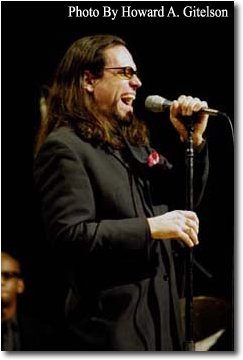 JI:
When you started off, what situation did you find around? Did you have to
make any choice? What kind of choices? JI:
When you started off, what situation did you find around? Did you have to
make any choice? What kind of choices?
K.E.: My Father is a church musician, and all of us were given instruments to play and lessons. I don't remember a time before singing. I am told I was making up parts and harmonies to the hymns in church, but this is probably apocryphal information. But music was always a joy to me, and I did it because it was natural and made me happy.
Then, when I was in college, some cats down the hall were playing Dexter Gordon,
Herbie Hancock, Dave Brubeck, people like that. It was just at the time that I was beginning to actively listen to things -- apart from classical music, which I was quite familiar with by then. It happened that I was able to start sitting in with small groups right just as soon as I started listening intently. Cats were kind, and audiences were always excited by my caterwalling. Very few singers on the scene (this was at
Gustavus College in Minnesota) were attempting anything like scatting, so I was bringing a more unique and crowd-pleasing thing to the stand.
JI: Is it important for you that Blue Note produces your work?
K.E.:
I am very pleased to have had all of my recordings on Blue Note. It is the world's greatest Jazz label, and this has helped my career enormously.
JI: Who first told that you had a talent for music?
K.E.: I would say accepting a gig playing for the door at "Milt Trenier's", a basement club at
Fairbanks & Ohio in Chicago. This was during graduate school, and it meant the beginning of not studying for school & instead boning up on the Jazz life. I did a gig there once a week on-and-off for two years or so, playing for the door & earning anywhere from 0 to 20 dollars a night. I played music with the house pianist, one
Karl Johnson, who had led his own all-black USO big band back in the day and was one bad mother. He took me under his wing & showed me in conversation & on the stand what it might mean to be a professional Jazz musician.
You can read about Karl further in the context of the second edition of the
Guerilla Diaries on my web site (www.kutelling.com).
I still bump into Karl every once in a while & am very glad every time I do.
JI: How did you form your musical, vocal and cultural education?
K.E.: I did mostly choral work from grade through graduate school. I never went to music school, and never took many individual lessons for voice. Mostly, I have elaborated and extrapolated from choral work, and learned from recordings, on the stand, and at the occasional Q&A with other musicians. MARK MURPHY laid some important information on me, as has Jon Hendricks. Most things I have absorbed by listening and watching and from hard work on my own.
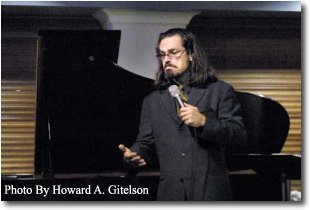 I wish I had more of that music school information. I'll spend my life trying to catch up there. On the other hand, if I had gone there, and not to a good liberal arts college and not gone on to the University of Chicago for Div. School, I doubt that I would be able to bring to bear the wider philosophical and literary awareness I have into the mix. Many times, students ask me where I get the ideas I do. Well, it's from having had a reasonably diverse and interesting intellectual career. I read a good deal, and try to stay current in the broader conversation. Also, one has to be curious about everything.
I wish I had more of that music school information. I'll spend my life trying to catch up there. On the other hand, if I had gone there, and not to a good liberal arts college and not gone on to the University of Chicago for Div. School, I doubt that I would be able to bring to bear the wider philosophical and literary awareness I have into the mix. Many times, students ask me where I get the ideas I do. Well, it's from having had a reasonably diverse and interesting intellectual career. I read a good deal, and try to stay current in the broader conversation. Also, one has to be curious about everything.
I should also specify a bit regarding my graduate studies. I was at the University of Chicago Divinity School
reading the Philosophy of Religion, which is a specialized academic category of study which lies somewhere between theology and straight philosophy. I was not there to become a priest but an academic - a professor. That having been said, I was there to try to answer deep level questions of meaning that were gnawing at me. While these questions were not answered ultimately, as many of the most important cannot be until death, I did arrive at some satisfactory working answers.
It does seem to me that graduate school sharpened my mind, my analytic and my writing skills. It gave me the tools to root around in questions of meaning, and to read thick books. It wasn't my niche, ultimately, but it was an experience of deep exploration. It also gave me some big words to throw around. I am proud of the time I spent there, and still sit on the
Divinity School's Visiting Committee.
Beyond that, any "influence" the prolonged discussion of metaphysical questions has had on my work is either self-evident in the work itself or is, frankly, irrelevant to public discussion of my current work. As
Saul Bellow put it, "[the artist's] inwardness should be, deserves to be a secret about which nobody needs to get excited."
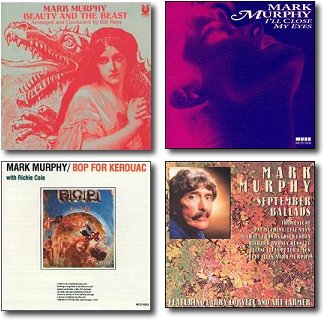 JI:
Whom do you consider models for yourself? Did you have chance to study with anyone of them? JI:
Whom do you consider models for yourself? Did you have chance to study with anyone of them?
K.E.: Mark Murphy is certainly the door through which I found out about the broadest range of Jazz singing possibilities. By this I mean that Mark distilled a great number of things which preceded him, and then showed how one could point them in the direction of his own new and original ideas. He recreated songbook classics and hipped up bop through his phrasing, arranging and unique vocal ingenuity. Mark shows us all that the singers' art is never done evolving. He showed how moving and dramatic an evening of Jazz singing could be. I also became aware of Kerouac and the whole Beat/Jazz connection through Mark. He has made a lifetime of innovative, truly great vocal Jazz records, and continues to innovate: I recommend
MARK MURPHY
Beauty and the Beast, Bop for Kerouac I and II, September Ballads, I'll Close My Eyes..
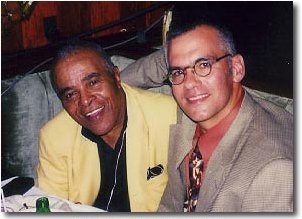 Jon Hendricks, of course, perfected the art of vocalese, which is the writing and performing of a lyric to a previously recorded instrumental solo. His brilliant work as a lyricist is unrivalled in this field for rhyming ingenuity and Mother Wit. His work leading the groundbreaking vocal
trio
Lambert, Hendricks and Ross cannot be underestimated. Jon is one of the all-time great improvising singers, and is the premier singing showman in Jazz. ANY Lambert, Hendricks and Ross side is a classic. What's more, Jon has made a number of solo records which are great. If you see Jon's name on it, it is important. Jon Hendricks, of course, perfected the art of vocalese, which is the writing and performing of a lyric to a previously recorded instrumental solo. His brilliant work as a lyricist is unrivalled in this field for rhyming ingenuity and Mother Wit. His work leading the groundbreaking vocal
trio
Lambert, Hendricks and Ross cannot be underestimated. Jon is one of the all-time great improvising singers, and is the premier singing showman in Jazz. ANY Lambert, Hendricks and Ross side is a classic. What's more, Jon has made a number of solo records which are great. If you see Jon's name on it, it is important.
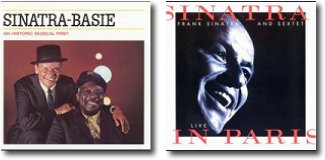 Frank Sinatra is THE example in swing and natural phrasing for all who are smart enough to know where to look. Never forget to listen to Big Frank. I especially love his live sides (At The Sands With The Count Basie & The Orchestra, Live in Paris, any live Frank Sinatra is THE example in swing and natural phrasing for all who are smart enough to know where to look. Never forget to listen to Big Frank. I especially love his live sides (At The Sands With The Count Basie & The Orchestra, Live in Paris, any live
Rat Pack
stuff)
While she lived, BETTY CARTER was the paragon of Jazz singer as total artist, total bandleader and total business manager-head. Her recording of "Spring Can Really Hang You Up The Most" from The Audience With BETTY CARTER is probably the most masterful modern reinvention of a standard ballad by a vocalist to have been recorded.
Al Jarreau at his best is as inspiring and swinging a singer as you are ever likely to hear. I listened to a lot of Al in college, and learned (or, tried to learn) most of his licks beat for beat. He is a great writer, too, and I continue to check out all of Al's stuff, because it has a tendency to be very human and very beautiful. His take on
Dave Brubeck's "Blue Rhondo" is a virtuoso statement beyond category.
Joe Williams brought a refinement and natural manliness to Blues-oriented Jazz singing which has gone unparalleled. His live, small group recording
A Swingin' Night At Birdland
(featuring
Harry "Sweets" Edison) is among the hippest available. Digging him swing with the
Basie Band on recordings is a necessary experience
Ella Fitzgerald, of course, brought singer's sensibility to the improviser's art, making every line she ever sang sound like the most natural and necessary thing in the world. The genuine sweetness of her personality comes through in all her recordings.
Eddie Jefferson invented a new art form. Who gets to do that? Vocalese, the aforementioned art of transcribing an instrumental solo and then writing a lyric for it belongs to Eddie alone, and could only have happened with the advent of recorded sound. God bless Eddie and also the great King Pleasure for bringing this baby to the broader world.
Tony Bennett continues to knock audiences out with his willingness to give his whole self to every audience, holding nothing back. It is his great gift - to open his heart up so completely every night on every song. I loved Tony before it was cool. However, I must admit that his comeback records in small group settings with the
Ralph Sharon Trio are his best.
Andy Bey = soulful and intelligent art of the highest order. Cat can make your dog weep. A great singer/player foolishly unheralded by the broader Jazz consortium. ANY Andy Bey record is a great record.
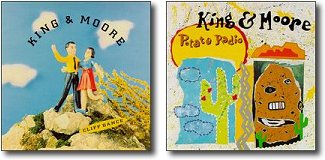 Have you heard of
Nancy King? You should have. She is a marvellous, witty, liberated Jazz singer living in the
Pacific Northwest and she is great. It is a crime that she has been offered no deal by the major labels. I tell you, she could make a lot of people very happy if they only could get a hold of her sides. Especially check out her duo records with my friend Glen Moore (from the super group
Oregon.) Have you heard of
Nancy King? You should have. She is a marvellous, witty, liberated Jazz singer living in the
Pacific Northwest and she is great. It is a crime that she has been offered no deal by the major labels. I tell you, she could make a lot of people very happy if they only could get a hold of her sides. Especially check out her duo records with my friend Glen Moore (from the super group
Oregon.)
Don't forget my lovely friend SHEILA JORDAN. She's also a liberated Jazz singer of the finest kind. There a lot of lessons in freedom and wisdom to be learned from a SHEILA JORDAN set. Pick up anything of hers you can find.
I also listened to a lot of Chet Baker coming up. He is a great teacher of how few "extras" a great song needs to communicate with real depth. Chet was a master minimalist, and yet not one iota of emotive power is ever missing from his work. Though the work he did in his youth is the first most people think of when they think of Chet, I recommend
Let's Get Lost, which he made in the year before his death (with
McCoy Tyner doing magnificent work on piano).
Of course, none of this could have happened without Pops. Louis Armstrong pointed the way for all of us, infusing singing with his own complete instrumentalist's consciousness. He was a master musician and improviser on all levels. He was transparent to his audiences. Because of that, he became a friend to the world
JI: Do you like to listen to your performances?
K.E.: Not as a rule. I need to when we are making a recording for release, for quality control. Performance recordings I archive.
JI: Your worst flaw and your best quality…
K.E.: I am impatient. This is my worst and best quality.
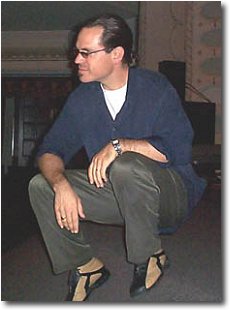 JI: Considering the contemporary jazz scene,
Dianne Reeves, Cassandra Wilson, Diana Krall, Dee Dee Bridgewater
and yourself, do you think now is a good time for jazz? Or rather do you feel music still lacks anything to equal the past greats' success? JI: Considering the contemporary jazz scene,
Dianne Reeves, Cassandra Wilson, Diana Krall, Dee Dee Bridgewater
and yourself, do you think now is a good time for jazz? Or rather do you feel music still lacks anything to equal the past greats' success?
K.E.: I think it is a bad time for Jazz in that the mass culture does not support and sustain a lively interest in it. Therefore there is a struggle for work, a struggle to stay new and still please the people, a struggle to keep an art form thriving and alive. This is not the fault of Jazz. There are always new wonders to surpass the old, new artists who are current and looking to the future. Nut they tend to face a greater struggle because the mass culture is told, "the greatest things happened in the past and can never be equaled." Then, to keep working or to be "stars", some artists kneel at this altar, perpetuating the problem and robbing themselves of true greatness. I am not necessarily speaking directly of the people you list. I am speaking of a systemic problem.
JI: What Ella, Betty, Sarah,
Billie, Louis had that is not possible to reproduce nowdays?
K.E.: A broad-based mass appeal rooted and
supported by a healthy and diverse Jazz base.
JI: Do you think that, after Betty Carter
demise, vocal jazz has lost the only one singer who dared to do what she felt
to without compromises? Who deserves her heritage?
K.E.: I wouldn't say the only singer who dared, but I would say one of the most daring. She was a great artist. There are always very few great artists.
JI: Do you think it's important for a singer to feel himself/herself the leader of the group where he/she sings?
K.E.: That depends on what kind of vision the singer has. I don't think of
Norma Winstone as a bandleader, but she is certainly a good singer and a real contributor to Jazz.
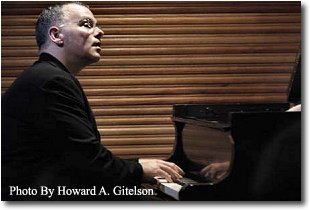 JI:
You have been working with Lawrence Hobgood since your first record release: are you two really so well integrated [matched]? And what makes that possible? JI:
You have been working with Lawrence Hobgood since your first record release: are you two really so well integrated [matched]? And what makes that possible?
K.E.: I have to say that Laurence is fully 1/2 of the equation for success in my/our career. He is a super-genius player - virtually omnipotent at the piano. He is gigantically gifted at hearing and composing melodies and harmonies. We've been working together since the first record, and it's clear that none of my records would have been as complete, intelligent and personal as they were without Laurence's invaluable input. Plus, we've been out on the road together now for almost ten years. So, at this point, the connection on stage is almost telepathic.
As far as writing goes, each case is unique. Sometimes, he'll bring something to me which he already has written a chart for - something he has written with my voice in his head. I have on occasion written a lyric long after the tune was written - as in the case with "
A Prayer For Mr. Davis" (The Messenger). Laurence wrote the music just a few days after
Miles' death and I didn't hear it until a few years later. Sometimes, as was the case with "Never Say Goodbye" (Close Your Eyes), I will have written something out. In this case, something I had played on a number of gigs with a different rhythm section. Then LH and I (and
Rob Amster, our great bassist) got together and hipped up the changes and arranged it for the recording. Sometimes one of us will hear a groove or a line and we'll work on it together. Most of the time these days, Laurence is in charge of the musical heavy lifting and I do the words. We are focusing on our strengths. But we respect one another's judgements in all areas and always try to hear what the other one is going for.
Laurence claims that he remembers meeting me when I was still working for Affordable Movers, and was scamming a free meal at the Hyatt where he was playing piano. The first time we met in a musical setting was at the
Mill, where Laurence was the regular pianist for the Ed Petersen band
on
Monday nights. I was the first singer ever (I think) to be invited to sit in for
an evening as guest artist, and I think LH was a little shocked that the
scrubby-faced mover he'd met the week before was now going to sit in for the
evening. But then we played a set, and at least some of his fears were allayed.
On the break we began a conversation about music which is ongoing.
JI: If you would take stock of your career, how do you feel today?
K.E.:
Working hard.
JI: During these years, have you reached what you aimed at or not yet?
K.E.: Not yet.
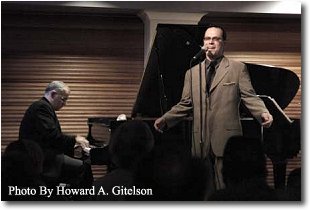 JI: Among the great names you have worked with, who paid you the nicest compliment and who told off you? JI: Among the great names you have worked with, who paid you the nicest compliment and who told off you?
K.E.: In the one master class I took with MARK MURPHY, he had everyone in the room get up to sing, one at a time, and had specific and, at times, prolonged suggestions for each. When my time came, he simply said, "My God, he's a Jazz singer. Everybody do it more like Kurt." That's all he had to say. It was very early for me -- I was still in graduate school. I'll always remember that.
JI: Do you think that jazz singing has evolved or do you think it has stuck to a particolar period?
K.E.: Much more stuck than moving into the future -- look at what
Wayne Shorter is doing. Then look at what most of the singers are doing. It's a shame.
JI: What do you want to communicate while you sing? As an artist, what goal do you aim at?
K.E.: All of us in the band are of a mind to give the highest quality musical experience we can - to play and so to communicate to the best of our abilities. I want people to be surprised, to be moved, to laugh, to remember something important they may have forgotten. I want them to have what they need.
JI: If you were Minister of Music, three
things you liked to do in favour of jazz?
K.E.: Give every child in every school an instrument and a band and a teacher. Use music to teach math, reading and "life skills". Have an hour every day of listening to great music from around the world, with a special focus on the history of Jazz and up to the present.
Insert a comment
©
2000 - 2003 Jazzitalia.net - All Rights reserved
|
© 2000 - 2026 All the material published on Jazzitalia is exclusively owned by the author. Moreover it is protected by International Copyright, so it is forbidden any use of it which isn't authorised by the rights' owner.
|
Questa pagina è stata visitata 7.170 volte
Data ultima modifica: 23/08/2003

|
|

